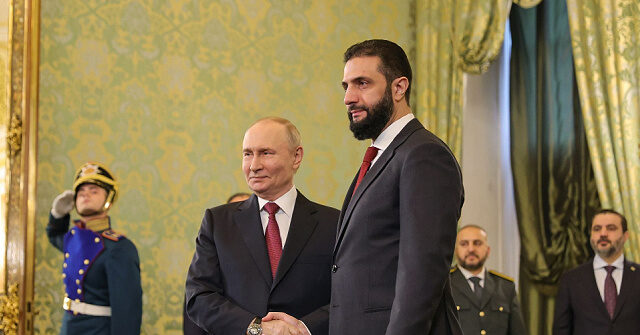Syrian President Ahmed al-Sharaa traveled to Moscow on Wednesday for a meeting with Russian President Vladimir Putin, who is desperate to preserve Russia’s investments in Syria after the fall of the Russian-supported dictator Bashar Assad.
Sharaa became the nominally “interim” president of Syria in December 2024, when his alliance of insurgent and jihadi groups launched a swift and sudden attack on Damascus that sent Assad into exile.
Assad appeared to have survived the brutal 14-year Syrian civil war with extensive military, economic, and diplomatic support from Russia and Iran. Since Russia became weakened and distracted by its grueling invasion of Ukraine, Sharaa and his colleagues correctly deduced Moscow would be unable to save Assad again.
The new rulers of Syria did not appear to have fond memories of Russia’s involvement in the war, and they were not happy that Assad found shelter in Russia after stuffing a good portion of the Syrian national treasury in his getaway bag. The new government quickly made it clear that Russia’s expensive naval and air bases in Syria could be forfeited. Sharaa rubbed salt in Moscow’s wounds by meeting with Putin’s nemesis Volodymyr Zelensky and expressing his support for the Ukrainian president.
Sharaa, anxious to win relief from Western sanctions and support for postwar reconstruction, made friendly overtures to Europe and the United States. He was able to secure both sanctions relief and a personal endorsement from President Donald Trump, which moved Syria even further out of Russia’s orbit.
Sharaa took a conciliatory tone in Moscow on Wednesday, stating that his government did not seek a complete break from Russia.
“We are trying to restore and redefine in a new way the nature of these relations so there is independence for Syria, sovereign Syria, and also its territorial unity and integrity and its security stability,” he told Putin during their meeting at the Kremlin.
“There are bilateral relations and shared interests that bind us with Russia, and we respect all agreements made with it,” he said.
Putin, in turn, hailed Russia’s long “special relationship” with Syria and congratulated Sharaa for holding the first parliamentary election since Assad was overthrown.
“I believe that this is a great success for you, because it leads to the consolidation of society, and despite the fact that Syria is currently going through difficult times, it will nevertheless strengthen ties and cooperation between all political forces in Syria,” Putin said.
Kremlin spokesman Dmitry Peskov said Putin and Assad discussed the future of Russia’s bases in Syria, including the vital Mediterranean port of Tartus and the airbase at Khmeimim. Sharaa did not mention either facility by name during his public remarks.
Rumors hinted that Sharaa asked Putin to hand Assad over for trial in Syria, possibly as part of a deal for Russia to keep its bases. A Syrian judge issued an arrest warrant for Assad in September on charges including murder and torture of his political enemies. Before leaving for Moscow, Sharaa told CBS News he intended to use “all available legal mechanisms” to hold Assad accountable for his actions.
Russian Foreign Minister Sergey Lavrov indirectly addressed those rumors by telling reporters that Russia granted asylum to Assad on “humanitarian grounds” because “he and his family faced physical extermination” at the hands of the rebellion.
Sharaa reportedly also sought compensation from Russia for war damages, the resumption of wheat shipments from Russia, and Russian help with creating a demilitarized zone along the border with Israel during his trip to Moscow.
Sources in the Syrian government said Sharaa was especially keen to keep Russia from sending weapons to pro-Assad remnants in Syria, and might instead help to build up the new Syrian Army. The Russians shrewdly hinted that the military bases they wish to retain control of would be very useful for such training and supply efforts.
Russian Deputy Prime Minister Alexander Novak told reporters that Russia offered to help Syria develop oil projects, strengthen its power grid, and restore damaged transportation systems.
“Russian companies have been working in Syria for a long time, at oil fields. There are fields that require development, those that are mothballed, and new fields. We are ready to participate,” Novak said.
Read the full article here
